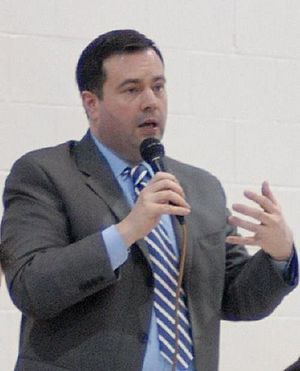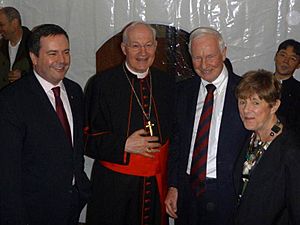Jason Kenney facts for kids
Quick facts for kids
Jason Kenney
|
|||||||||||||||||||||||||||||||||||||||||||||||||||||||||
|---|---|---|---|---|---|---|---|---|---|---|---|---|---|---|---|---|---|---|---|---|---|---|---|---|---|---|---|---|---|---|---|---|---|---|---|---|---|---|---|---|---|---|---|---|---|---|---|---|---|---|---|---|---|---|---|---|---|
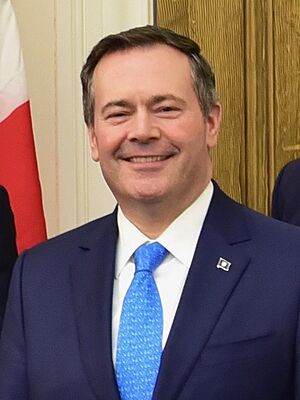
Kenney in 2020
|
|||||||||||||||||||||||||||||||||||||||||||||||||||||||||
| 18th Premier of Alberta | |||||||||||||||||||||||||||||||||||||||||||||||||||||||||
| In office April 30, 2019 – October 11, 2022 |
|||||||||||||||||||||||||||||||||||||||||||||||||||||||||
| Monarch | |||||||||||||||||||||||||||||||||||||||||||||||||||||||||
| Lieutenant Governor | |||||||||||||||||||||||||||||||||||||||||||||||||||||||||
| Preceded by | Rachel Notley | ||||||||||||||||||||||||||||||||||||||||||||||||||||||||
| Succeeded by | Danielle Smith | ||||||||||||||||||||||||||||||||||||||||||||||||||||||||
|
|||||||||||||||||||||||||||||||||||||||||||||||||||||||||
|
|||||||||||||||||||||||||||||||||||||||||||||||||||||||||
|
|||||||||||||||||||||||||||||||||||||||||||||||||||||||||
| Personal details | |||||||||||||||||||||||||||||||||||||||||||||||||||||||||
| Born |
Jason Thomas Kenney
May 30, 1968 Oakville, Ontario, Canada |
||||||||||||||||||||||||||||||||||||||||||||||||||||||||
| Political party | United Conservative (since 2017) | ||||||||||||||||||||||||||||||||||||||||||||||||||||||||
| Other political affiliations |
Federal: Reform (1997–2000) Alliance (2000–2003) Conservative (since 2003) Provincial: Progressive Conservative (2016–2017) |
||||||||||||||||||||||||||||||||||||||||||||||||||||||||
| Residences | Calgary, Alberta, Canada | ||||||||||||||||||||||||||||||||||||||||||||||||||||||||
| Alma mater | University of San Francisco (no degree) | ||||||||||||||||||||||||||||||||||||||||||||||||||||||||
| Signature |  |
||||||||||||||||||||||||||||||||||||||||||||||||||||||||
Jason Thomas Kenney (born May 30, 1968) is a Canadian politician. He was the 18th premier of Alberta from 2019 to 2022. He also led the United Conservative Party (UCP) during that time. Before becoming Premier, he was a member of the Legislative Assembly (MLA) for Calgary-Lougheed.
Kenney was the last leader of the Alberta Progressive Conservative Party. This party later joined with the Wildrose Party to create the UCP. Before working in Alberta politics, he held several important jobs in the Canadian government. He served under Prime Minister Stephen Harper from 2006 to 2015.
Kenney studied philosophy at the University of San Francisco. He returned to Canada without finishing his degree. He then worked for groups that focused on how the government spends money. In 1997, he was first elected to the House of Commons.
Contents
- Early Life and Education
- Early Political Career
- Working for the Prime Minister
- Minister of Citizenship, Immigration and Multiculturalism
- Minister of Employment and Social Development
- Minister of Defence
- Return to Provincial Politics
- Premier of Alberta
- After Being Premier
- Political Views
- Personal Life
- Awards and Recognition
- Images for kids
Early Life and Education
Jason Thomas Kenney was born on May 30, 1968, in Oakville, Ontario. His father was a teacher. Kenney attended a private Catholic high school in Saskatchewan. He was inspired to enter politics after a brief talk with former prime minister John Diefenbaker.
Kenney studied philosophy at the University of San Francisco. He became interested in conservative ideas there. He later returned to Canada and worked for the Saskatchewan Liberal Party. In 1989, he became the first executive director of the Alberta Taxpayers Association. This group worked for careful government spending. In 1990, he became the president of the Canadian Taxpayers Federation. This group also watches how governments spend money.
Early Political Career
Kenney was first elected to the Canadian House of Commons in 1997. He was 29 years old. He was a member of the Reform Party of Canada. This party later became the Canadian Alliance. He was re-elected several times as a member of the Conservative Party of Canada.
While in opposition, Kenney held various roles. He was a critic for different government areas. He was part of a group of MPs known for their strong opinions against the ruling Liberals.
Working for the Prime Minister
In 2006, Jason Kenney became a special assistant to Prime Minister Stephen Harper. This role is called a Parliamentary Secretary. In 2007, he became the Secretary of State for Multiculturalism and Canadian Identity. In this job, he worked with different ethnic communities across Canada.
He helped create the Community Historical Recognition Program (CHRP). This program gave money to groups to remember times when Canadian immigration policies were unfair. Kenney believed this program was a success.
Minister of Citizenship, Immigration and Multiculturalism
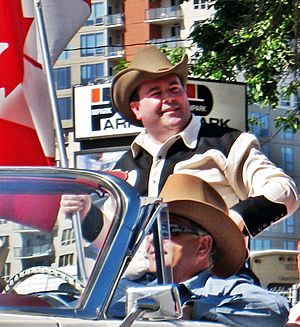
In 2008, Kenney became the Minister of Citizenship and Immigration. He was also responsible for multiculturalism. He launched South Asian Heritage Month to celebrate Asian Canadian culture.
Kenney made changes to the Skilled Worker Immigration Program. These changes aimed to make it easier for skilled workers to come to Canada. He wanted to accept migrants who could best help the Canadian economy. He also worked to reduce how long it took to process immigration applications.
He introduced Discover Canada, a new guide for people applying to become Canadian citizens. This guide helped new citizens learn about Canada's history and values. Kenney also worked to help "Lost Canadians" get their full citizenship status back. These were people who had lost their Canadian citizenship due to old laws.
Refugee System Changes
Kenney also worked to change the Canadian refugee system. The goal was to help more refugees settle in Canada. He promised to resettle more refugees from 2011 to 2012.
Office of Religious Freedom
Kenney helped create the Office of Religious Freedom. This office was part of Canada's foreign affairs department. Its job was to watch for religious unfairness around the world and promote religious freedom. This office was later closed in 2016.
Minister of Employment and Social Development
In 2013, Kenney became the Minister of Employment and Social Development. In this role, he worked on improving how disability appeals were handled. He also helped create the Canada Job Grant. This program aimed to train unemployed workers.
Minister of Defence
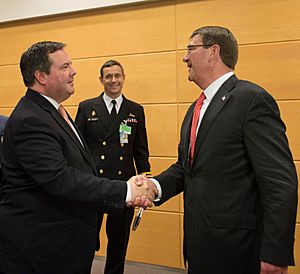
In 2015, Kenney was promoted to Minister of Defence. He focused on national security. He believed Canada needed to fight against groups like Islamic State to keep the country safe.
In April 2015, Kenney announced that Canadian soldiers would go to Ukraine. They would train Ukrainian forces as part of Operation UNIFIER. These soldiers arrived in September 2015.
Return to Provincial Politics
After the federal election in 2015, Kenney decided to run for the leadership of the Alberta Progressive Conservative Party. He wanted to unite Alberta's two main centre-right parties. He resigned from his seat in the House of Commons in September 2016.
Kenney was elected leader of the PCs in March 2017. He then worked to merge his party with the Wildrose Party. This merger happened in July 2017, forming the new United Conservative Party. In October 2017, Kenney was elected as the first full-time leader of the UCP. He then became the Leader of the Opposition in Alberta.
Premier of Alberta
Under Kenney's leadership, the United Conservative Party won the 2019 Alberta general election. They formed a majority government. On April 30, 2019, Kenney became the 18th Premier of Alberta.
His government passed laws to remove the carbon tax and change corporate taxes. They also worked to reduce government spending. Kenney's government also started a public inquiry into groups that were seen as spreading false information about Alberta's oil and gas industry.
Leadership Challenges and Resignation
Kenney faced criticism for how his government handled the COVID-19 pandemic. This led to some members of his party questioning his leadership. In May 2022, a vote was held to see if party members still supported him. He won the vote by a small margin, with 51.4% support. However, he announced that he would step down as UCP leader and Premier. He remained Premier until October 11, 2022. Danielle Smith was chosen to take his place.
After Being Premier
On November 29, 2022, Jason Kenney resigned as an MLA for Calgary-Lougheed. In February 2023, he started a new job as a senior advisor for a law firm called Bennett Jones. His old seat was won by Eric Bouchard in the May 2023 Alberta election. In March 2023, Kenney was nominated to the board of ATCO, a large company.
Political Views
Kenney has generally held socially conservative views throughout his political career. He has supported traditional definitions of marriage. He has also been recognized for his efforts to connect with different ethnic minority groups in Canada. He believed that many new Canadians shared conservative values like a strong work ethic.
Personal Life
Kenney is bilingual, meaning he speaks both French and English. He has never been married and does not have children.
Awards and Recognition
Kenney has received several awards and recognitions for his work:
- He received the Queen Elizabeth II Golden Jubilee Medal in 2002.
- He received the Queen Elizabeth II Diamond Jubilee Medal in 2012.
- He received the Albertan version of the Queen Elizabeth II Platinum Jubilee Medal in 2022.
- In 2004, Maclean's magazine named him one of Canada's "100 Leaders of the Future."
- In 2009, Maclean's also gave him the award for "Best Overall MP."
- In 2011, Maclean's named him the "hardest working" MP.
- In 2014, he received the UN Watch Moral Courage Award.
- In August 2016, the President of Ukraine awarded Jason Kenney with an Order of Merit, Third Class.
- In 2025, Kenney was awarded the Tryzyb Award from Ukrainian diaspora in Canada as a "Friend of Ukraine."
Images for kids
-
Kenney with Stephen Harper and Narendra Modi at a gurdwara in Vancouver
-
Kenney with Andrew Scheer in 2019.
 | James B. Knighten |
 | Azellia White |
 | Willa Brown |


